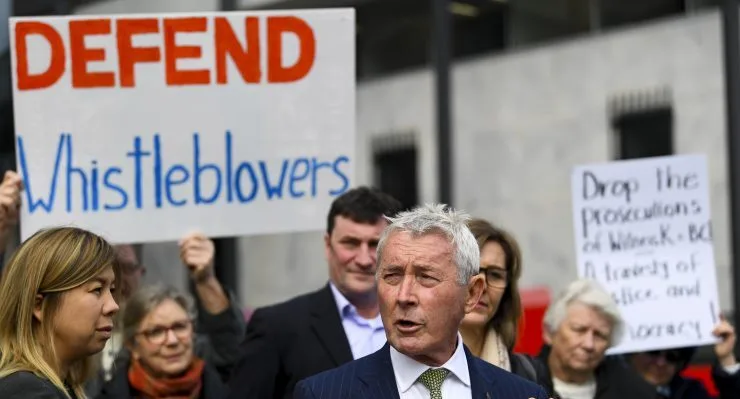In one of his last moves as a senator, Rex Patrick has advanced his battle against the National Archives to release important documents relating to John Howard and Alexander Downer’s undermining of Timor-Leste in the early 2000s. Callum Foote reports on the latest efforts to end the persecution and secret trials of whistleblower Bernard Collaery.
Last month Senator Rex Patrick wrote to the new Attorney-General, Mark Dreyfus, asking him to overturn a decision made by the Australian Appeals Tribunal to hold part of the trial and discussion of certain documents, in secret.
The decision was made, according to Dreyfus, by former attorney-general Michaelia Cash, who formed the view that “disclosure of the confidential evidence would be contrary to the public interest because it would prejudice the security, defence or international relations of Australia”.
Patrick is attempting to get access to a cabinet submission from 2000 that details the Howard government’s Timor Gap negotiations strategy that resulted in Australia laying claim to roughly 80% of the Greater Sunrise gas field on the maritime boundary between East Timor and Australia.
Senator Patrick argued against the former attorney general’s view that revealing the cabinet submission would harm Australia’s international relations by appealing to the role of transparency in healing relations with East Timor.
Damaged relations with Timor-Leste
Patrick’s concerns about the relationship with East Timor are backed by Xanana Gusmao, the small nation’s inaugural president. Gusmao spoke to the tribunal supporting Patrick’s claims, saying that “based on my roles representing Timor-Leste I have formed the view that full disclosure of the historical Cabinet documents relating to the Reported Facts will assist the bilateral relationship between Australia and Timor-Leste by further strengthening the ties that Timor-Leste and Australia have painfully rebuilt during the conciliation process.”
Importantly, Gusmao continued that “secrecy creates a sense of suspicion and impropriety and cannot remain a feature of our good neighbourly relations”.
The near-total lack of transparency regarding Australia’s dealings with Timor Leste has dramatically damaged our relations with our neighbour.
Professor Michael Leach of the Swinburne University of Technology has researched and published widely on the politics and history of the small nation. A founder of the Timor-Leste Studies Association, he says that:
Though I understand the need for secrecy generally in international relations, it’s now well established that one of the major obstacles to the improvement in the relationship between Australia and Timor-Leste is secrecy. There’s a pattern of secrecy undermining the bilateral relationship with Timor-Leste that’s now well established and puts it in a special category.
“The new incoming president of Timor-Leste, José Ramos-Horta, has raised the issue that the spying which occurred on Timor-Leste back in 2004 was an unfriendly act to a friendly ally and neighbour and its not in the normal register of intelligence activities because it was for commercial purposes.
Leach refers to the former foreign minister Alexander Downer’s role on the board of Woodside after his retirement from politics in 2008 and Ashton Calvert, the departmental secretary at the time, ending up on Woodside’s board in 2005.
A voice for Timor and whistleblowers keeps up the good fight
China’s growing influence over East Timor
Dreyfus’s reply was forwarded to the Minister for Foreign Affairs, Penny Wong, who spoke with East Timor’s foreign minister last month after China’s Foreign Minister Wang Yi signed agreements with Timorese diplomats related to fisheries, water and sanitation.
China also agreed to support the development of East Timor’s healthcare system, including by building hospitals and sending medical teams there. And China pledged to help support East Timor’s defence and education sectors.
Wong also met President Jose Ramos-Horta.
Hopes for Collaery case
Dreyfus’ position on this matter represents one of the first chances the new Labor government has to take a different approach to its predecessor on government transparency; the other being the opportunity to push the US and UK for the release of Julian Assange.
The persecution of Bernard Collaery and Witness K is intimately linked to Australia’s relations with East Timor.
The bugging “certainly undermined the relationship between Australia and Timor Leste for a long time. If you like, the prosecution of Bernard Collaery is an unsightly hangover of that period which has otherwise passed,” says Leach.
“The question does come to the fore about whether this prosecution should be dropped, and there is some indication that it may well be.
“Political interference in prosecution is never a good look, whether you are instituting them or dropping them.”
However, Leach believes that the reason that Australia-Timor relations are back on track is that the CMATS treaty was challenged and the challenge to the CMATS treaty was on the basis of want of good faith which was directly bolstered by Collaery and Witness K’s exposing of the 2004 bugging.
“So the series of events which went to this prosecution are the same series of events which have improved the bilateral relationship enormously.”
“There’s a strong whiff about this stuff, and I think it’s time for the Australian state to just drop the prosecution of this person. Really we should be looking elsewhere for evidence of wrongdoing in this matter,” Leach said.
The Attorney-General has not commented on whether the Labor government will move to take a position of heightened transparency and amend whistleblower protection although Dreyfus hinted this week that the prosecution of Collaery may be discontinued.
What Dreyfus’s letter does show, according to Patrick is “an appetite to consider exposing some of the abhorrent conduct of the Howard government towards Timor Leste back in the early 2000s.
“In that respect, it serves as a signal that he may also be open to dropping the charges in relation to Mr Collaery. Because that sordid spying affair is all part of the conduct that needs to be disclosed.”
Justice for whistleblower Bernard Collaery is as far away as ever
Callum Foote was a reporter for Michael West Media for four years.

